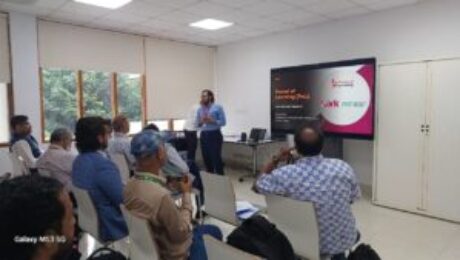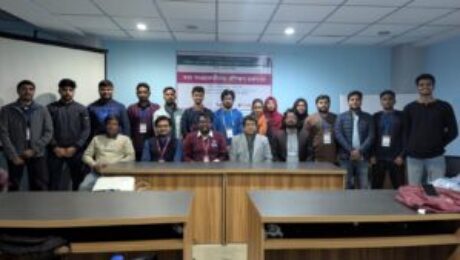Professor Dr. Rumana Huque, Executive Director of ARK Foundation, sheds light on the key prospects and challenges in addressing these inequalities. Discover her insights on how we can work together to bridge the gap and ensure equitable healthcare for all.
- Published in News and Media, Video
No Comments
We’re excited to bring you the latest episode of the ARK Podcast! Join our host Abdullah M. Rafi as he sits down with Mr. Badruddin Saify, Research Associate at ARK, to talk about his inspiring Innovation Fund journey – early challenges, key learnings, and the drive to make research impactful. Tune in for insights, reflections,
- Published in Featured, News and Media, Video
Experts Urge Stronger Tobacco Cessation Services in Bangladesh’s Health System ARK Foundation hosted a webinar titled “Tobacco Cessation in Health Systems: Policy, Research & Reality”, bringing together experts and participants from academia, advocacy groups, and research organizations, including international researchers. The event explored the status, challenges, and opportunities for integrating tobacco cessation into Bangladesh’s health
- Published in Event, News, News and Media
National Situation Analysis on Policy and Programmes Promoting Physical Activity in Bangladesh (SAT)
The main objective of this project was to identify the barriers and facilitators of physical activities to reach Global Action Plan on the prevention of NCDs in Bangladesh. The situation analysis also attempted to provide an overall view of the current scenario regarding the presence of physical activity as a standalone action area or as
- Published in Non-Communicable Disease, Our Work
In every Community Clinic, there is a Community Group (CG) and multiple Community Support Groups (CSGs). They have different tasks for community engagement. The aim of the study was to assess the role of Community Group (CG) and Community Support Group (CSG) in Community Engagement during the COVID-19 pandemic and after COVID-19. The study also
- Published in Communicable Disease, Our Work
Community-led Responsive and Effective Urban Health Systems (CHORUS) is a Research Programme Consortium that brings together health researchers from South Asia, West Africa, and the UK. CHORUS works with communities, health professionals and city level decision makers to strengthen the urban health system, especially for the urban poor. ARK Foundation is currently implementing three projects
- Published in Non-Communicable Disease, Our Work
Bangladesh’s improving economy offers potential for increased health funding, yet public health investment remains low, with high out-of-pocket (OOP) expenses and per capita spending (USD 42) well below WHO’s recommended USD 88. While progress has been made in maternal health, immunization, and managing non-communicable diseases through primary and secondary care facilities, critical indicators like infant
- Published in Health Systems, Our Work
People with severe mental illness (SMI) are at higher risk of obesity linked to medication side effects, poor diet, inactivity, and sleep issues which increases their vulnerability to non-communicable diseases like heart disease and diabetes. Globally, 25.9% of people with SMI are obese, with rising rates in low- and middle-income countries (LMICs), especially South Asia.
- Published in Non-Communicable Disease, Our Work





